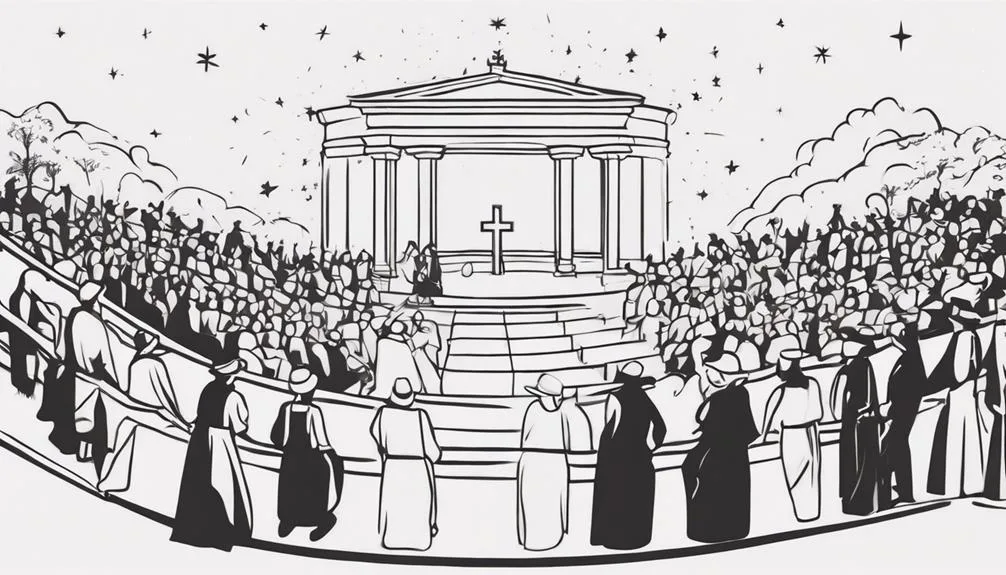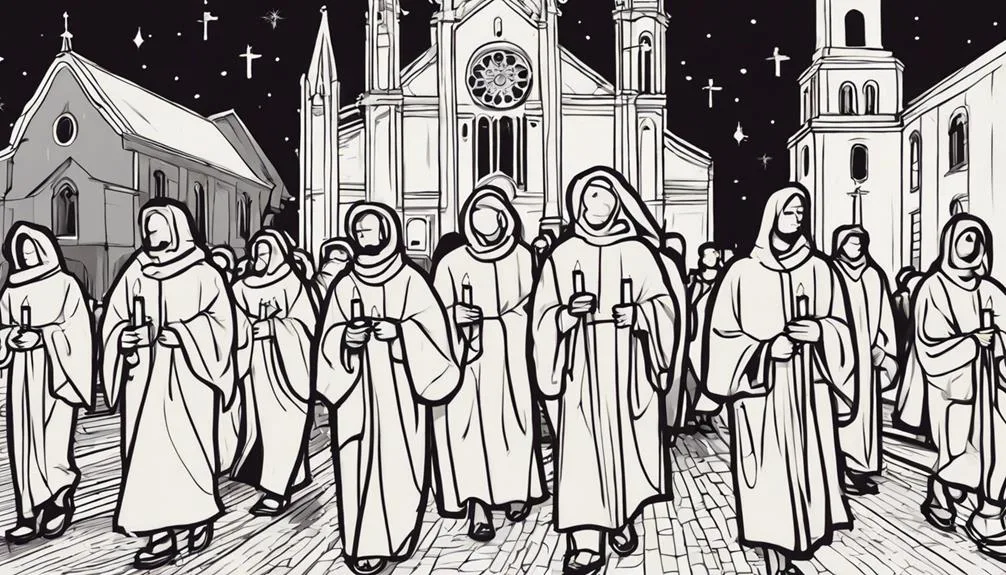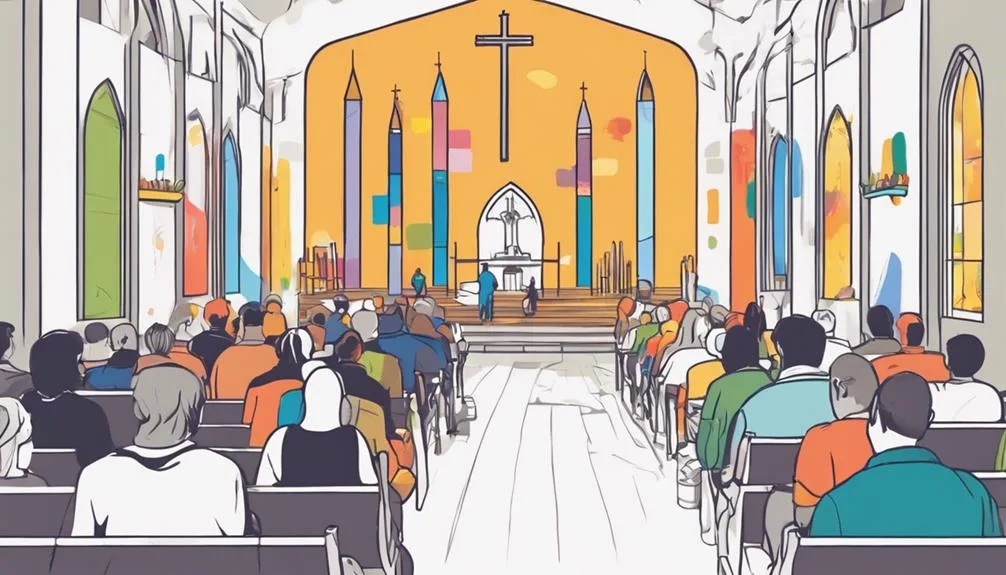Holy Week offers a chance to slow down and think about your faith. You can do many things, like watching Passion Plays, helping out through charity, or spending time in quiet thought.
Activities range from joining processions to making religious art, providing ways to reflect and connect with others. These experiences can deepen your understanding and impact your spiritual journey in meaningful ways.
Key Takeaways
- Participating in Passion Plays and processions immerses adults in the profound spiritual narrative of Holy Week.
- Engaging in charity work and community service reflects Holy Week’s themes of sacrifice and renewal.
- Personal growth is fostered through practices like daily scripture reading and attending silent retreats.
- Mindfulness and reflection techniques, including prayer walks and setting the right environment, enhance spiritual connection and mental clarity.
1. Attending Passion Plays

One impactful way to immerse yourself in Holy Week is by attending a Passion Play, where the story of Jesus’ crucifixion and resurrection comes to life on stage. These performances aren’t just about actors reciting lines; they’re a profound experience, steeped in tradition and artistry.
The costume design, for instance, plays a vital role in transporting you back to the time of Jesus. It’s not just about fabric and colors; it’s about authenticity and historical accuracy. Costume designers pour hours of historical research into ensuring that each piece reflects the period accurately, contributing greatly to the immersive experience.
As you sit in the audience, you’re not just watching a play; you’re witnessing a recreation of one of the most pivotal moments in history, brought to life by meticulous attention to detail. From the smooth shifts of the actors’ robes to the accurate portrayal of Roman soldiers, every element has been carefully researched and thoughtfully executed.
This dedication to authenticity enhances your connection to the story, making it a deeply moving part of your Holy Week observance.
2. Volunteering for Charity Work

Moving from witnessing the story of compassion and sacrifice through Passion Plays, you can embody these values by volunteering for charity work during Holy Week. Engaging in Charity workshops and Donation drives not only allows you to give back to the community but also deepens your understanding of selflessness and community service.
| Day | Activity | Location |
|---|---|---|
| Monday | Food Bank Sorting | Local Church |
| Tuesday | Clothing Donation Drive | Community Hall |
| Wednesday | Homeless Shelter Cooking | Shelter Kitchen |
| Thursday | Elderly Home Visitation | Senior Center |
| Friday | Charity Workshop Hosting | Public Library |
3. Participating in Holy Week Processions

Joining Holy Week processions allows you to actively partake in the solemn remembrance and celebration of sacred events. These processions, steeped in historical significance, offer a unique way to connect with the spiritual essence of Holy Week. Whether you’re observing from the sidelines or walking in the procession, the experience is profoundly moving.
But to truly immerse yourself, consider these steps:
- Learn About Historical Significance: Understanding the roots and meanings behind the processions enriches your experience. Many of these traditions date back centuries and embody the spiritual journey of countless generations before you.
- Costume Preparation: For those participating, costume preparation is key. Depending on the procession, this might involve traditional robes or specific symbols of faith. It’s a tangible way to step into the historical and spiritual significance of Holy Week, embodying the roles and stories commemorated.
- Engage with the Community: Participation in Holy Week processions isn’t only about personal spirituality but also about community. Engaging with fellow participants and spectators builds a collective spirit of reverence and celebration.
Participating in Holy Week processions deepens your spiritual connection and sense of community through historical engagement, costume preparation, and communal involvement. This shared experience enhances the solemn remembrance and celebration, creating a moving tribute to Holy Week’s sacred events.
4. Daily Scripture Reading

Dedicating time each day to scripture reading can profoundly deepen your connection to the Holy Week experience. Setting aside moments for reflection and engaging with biblical texts allows you to immerse yourself in the narrative of Jesus’ passion, death, and resurrection. It’s not just about reading; it’s about letting these sacred words transform you from within.
Incorporate Bible journaling into your daily scripture reading routine. This isn’t just about jotting down notes. It’s an intimate process where you can express your thoughts, feelings, and prayers inspired by the passages you read. You’ll find it’s a powerful way to connect with God’s Word on a personal level. As you read, ask yourself what message is being conveyed and how it applies to your life. This practice can lead to profound insights and spiritual growth.
Don’t overlook the power of Scripture memorization. It’s one thing to read the words, but memorizing them embeds these divine truths in your heart. You’ll carry the strength and wisdom of these scriptures with you throughout the day, ready to recall them in moments of need or reflection.
This Holy Week, let scripture reading, journaling, and memorization be your spiritual lifeline. For a concise guide to family-centered activities, spiritual Holy Week activities for families provides tips on bringing these practices into your family’s Holy Week observance.
5. Joining Silent Retreats

Beyond deepening your spiritual journey through scripture, consider enhancing your Holy Week by participating in a silent retreat. Silent retreats offer a unique opportunity for personal growth and spiritual renewal. Here, you’re invited to step away from the noise of daily life and enter a space of quiet reflection and meditation.
By joining a silent retreat, you’re committing to a period of silence, allowing for a deeper level of personal introspection. This time away from the distractions of conversation and technology fosters an environment where you can focus fully on your spiritual well-being. Here are three compelling reasons to take part:
- Learn New Meditation Techniques: Silent retreats often introduce participants to various forms of meditation, guiding you through techniques that can help calm the mind and deepen your connection to your faith.
- Enhance Personal Introspection: The quiet environment is perfect for reflecting on your life, beliefs, and the meaning of Holy Week. This introspection can lead to profound personal insights and spiritual growth.
- Renew Your Faith: Without the distractions of the outside world, you’ll find it easier to focus on your spirituality, potentially leading to a renewed sense of faith and purpose.
Embrace the silence this Holy Week and discover the transformative power of a silent retreat.
6. Creating Religious Art

Engaging in the creation of religious art offers a unique way to connect with your spirituality during Holy Week. This period, rich in reflection and devotion, provides the perfect backdrop for you to explore your faith through the beauty of art. Art workshops tailored to adults during this sacred time can offer you not just a creative outlet, but a deeply spiritual experience as well.
You’ll find that many communities host art workshops specifically designed around religious themes. These sessions can vary from painting and sculpture to more specialized forms like Iconography lessons. Iconography, the tradition of creating religious images and icons, can be particularly meditative and fulfilling. Through these lessons, you’re not just learning a new skill; you’re immersing yourself in the history and spirituality of your faith.
Participating in these workshops allows you to express your devotion in a tangible form, creating something lasting and meaningful. It’s a way to enhance your Holy Week experience, making it more personal and introspective. Whether you’re a seasoned artist or a curious beginner, there’s something profoundly satisfying about bringing your faith to life through art.
7. Reflective Prayer Walks

After exploring your faith through art, consider deepening your spiritual journey with reflective prayer walks during Holy Week. This activity isn’t just about physical movement; it’s an opportunity to connect more deeply with your spirituality, nature, and the community around you.
Here’s how you can make the most out of these walks:
- Integrate Nature Meditation: Choose a path that meanders through natural beauty, whether it’s a lush park, a serene beach, or a quiet woodland. As you walk, let the sights, sounds, and smells of nature guide your reflections. Feel the presence of a higher power in the rustling leaves, the waves’ gentle crash, or the earth beneath your feet.
- Focus on Personal Reflection: Use this time to meditate on the themes of Holy Week. Reflect on moments of forgiveness, sacrifice, and renewal in your life. Consider carrying a journal to jot down insights or prayers that come to mind.
- Encourage Community Discussion: If you’re walking with others, dedicate time to share your reflections or discuss passages that resonate with Holy Week’s themes. This can deepen your understanding and strengthen your bond with fellow participants.
Reflective prayer walks blend physical activity, nature meditation, and community discussion, offering a unique way to observe Holy Week.
Wrapping Up
Diving into these Holy Week activities offers more than just ways to pass the time; it’s an invitation to deepen your faith and connect with your community.
From the reflective ambiance of Passion Plays and the joy of giving through volunteering to the peace found in silent retreats, each activity is a step towards personal growth and spiritual enrichment.
Let these experiences open your heart to the true essence of this sacred season. As you explore these paths, consider what it means to truly live your faith beyond this week.
Will these moments inspire a lasting transformation in your approach to spirituality and community?


